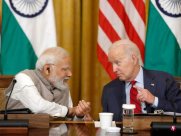Source: Zhongshi News Network
Author: Liu Birong
Indian Prime Minister Modi went to the United States for two days on June 21 to visit the United States, and gave a speech at the joint meeting of the two House of Representatives. He also accepted the US banquet hospitality and pushed the relationship between India and the United States to a new peak.
The national defense and scientific and technological cooperation between the United States and India also deepened due to this visit.The United States agreed to participate in the manufacture of new aircraft engines as the "non -treaty allies". It also agreed to purchase 30 US -defending drones worth $ 3 billion worth of US $ 3 billion.The United States and the United States also reached an agreement, and the US ship will be able to stop in India's port to repair.The two countries have also officially launched the "India -US defense accelerated ecosystem", which can accelerate the development of the R & D achievements of startups to the national defense industry.These agreements make Modi happily call directly, which is the "unprecedented trust in history" of the two countries.
Under the "Key and Emerging Technical Initiative" launched in January this year, the two countries have reached a series of cooperation agreements in AI, quantum computing, space detection, semiconductor and other aspects.Micron agreed to invest $ 825 million in chip assembly and testing plants in Modi's hometown of Gugatt Province; application materials have also been announced in the establishment of a commercialization and innovation center in India.This made Modi full of delivery, and also made the relationship between the United States and India look bright.
Compared with the promotion of government officials, the American academic and media are relatively pragmatic.They believe that the United States and India relations are important, but they call on the government to be pragmatic.They said that India was India, not India in the imagination of US officials.The U.S. government always says that one of the two countries and India is the oldest democratic country, one is the most populous democratic country, and the common value of the two countries.However, critics pointed out that Modi opened a democratic reversing after he came to power (some Democratic Liberal Liberal Congress refused to attend the Modi Parliament speech), so the two countries shared only interests, not value.The relationship between the two countries is only a transaction.
In fact, whether the two countries have always overlapped the benefits of the United States and India are not sure.From the Nahru era, the United States has always wanted to win India, but no matter how much assistance to India, India has announced that his policy is not an alliance.The New York Times described India like this: "She is the most important swing country in global politics. Her influence is enough to change international power balance, but she supports which side is never clear and inconsistent." India is also the world's top 10 economy in the world.In the body, the only country that has not been in the struggle of "democracy against the totalitarian" that Biden appealed.
Although India does not make alliances, it has traditionally gone close to Russia, especially military relations.But after the outbreak of the Russian and Ukraine War, many of them changed.The rapid consumption of Russian weapons is not enough to meet India's demand (India is the largest weapon importer), and Russia is getting closer and closer to China, nor is it to India. ThereforeFind a strategic partner.The US -Indian military cooperation relationship has a breakthrough space.
This is the world view of the United States. The United States looks at the United States and India from the perspective of the Indo -Pacific Union. India's world view may not be the case.The world view of India is not a "things confrontation" of democracy against totalitarian authority, but the "North -South confrontation" of the poor country and the rich, and it is a diverse world pattern.However, this does not mean that there is no overlap interest in India, which represents the world's self -proclaimed India and the United States, which is a democratic country.Curbing China's expansion is the common interest at this stage.
India advertises multiple alliances, and diplomatic positions often change due to things because of their cases.Perhaps resistance with the United States is the current consensus, but how far can this consensus go?Can the United States be so high in India, can they eventually replace India's statement in the Russia and Ukraine War?They have to be observed.
(the author is a professor at the Department of Political Department of Soochow University)


